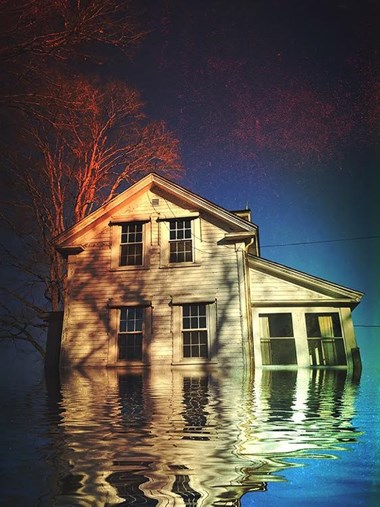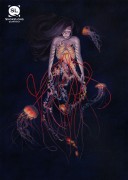My husband said something very clever once. I had sliced my wrist—this was only an accident—and we were sitting in an emergency room. A nurse had wrapped my arm in bandages and then left to take care of other people, some of whom were also bleeding. People don’t know how much blood there is in a body. My own blood was seeping through the bandages, appearing at the surface, spreading. It seemed, at least to me, that it might not stop. My husband was looking at the bandages and said, “White contains everything, including nothing.” I had never heard him say something like that, and I wanted to write it down, but it was my writing hand that was bandaged. I decided to repeat it to myself until it was impossible to forget. It seemed to me that he might never say another thing like it.
When we were first married, we lived near a great lake so polluted that someone developed a roll of film in it. I don’t know what objects or people were in the pictures, just that someone developed the roll.
After that, we lived near an ocean, which was healthier. The winters were hard, though, and also crystalline. When it was sufficiently cold, there were starbursts all over the car’s windshield. People still went surfing, even in January and February. They wore black wetsuits and one day we could hear them hooting with cold when they came back in to shore. My husband said he envied them and purchased a wetsuit the following week, but I never saw him in it. Not even once.
The second year we lived there, the body of a sperm whale turned up on the beach and it was scored with gashes. The newspaper said it was a pygmy or a dwarf, that its demise was age-related, that it surfed in already dead. They removed the skull for keeping, sent a rib on to a lab and placed the rest ten feet deep into the sand. “I want to come back as a blue whale,” my husband said. “Imagine having a heart the size of a car.” When we were first married his mother gave us six months. We made it six years just to spite her.
The day that we divided everything up, we were very careful. Our packing was so amicable that his mother wept in frustration. It was a Sunday afternoon, something like a dream, and the people in it resembled friends, relations. They helped us pass our boxes and furniture into a pair of vans, but nobody spoke except to say thank you. Thank you. One van drove one way, the other van went off in the opposite direction, but, aside from that, the vans looked identical.
A year later, there was a terrible hurricane that swept through the area where we used to live. There was more rain than anyone could remember, and the wind drove the ocean up past the beaches and the breakwalls. I read in the newspaper how the street we used to live on had been flooded. There was even a photograph that showed part of our old house. I couldn’t believe it. I recognized the front door, the part that wasn’t submerged, and the windows right away. Firemen were clustered along the edge of what would have been the porch if you could see it, up to their hips in water. They had their hands on the edge of a canoe and were helping a young couple and their cat get into it. The funny thing about the picture was that the couple didn’t look the least bit concerned, even though they were getting ready to ride down the river that yesterday was their street.

Notes from Guest Reader Huan Hsu
I picked “Sea of Love” because I couldn’t stop thinking about it. When I saw the title, I braced myself for one of those breakup/heartache stories that SmokeLong wants to see less of, but the voice was so arresting and immersive, and the story, which is indeed about love, earns its title with waves of fresh, evocative mini-scenes that build a remarkably complete and ultimately satisfying narrative.


 The core workshop of SmokeLong Fitness is all in writing, so you can take part from anywhere at anytime. We are excited about creating a supportive, consistent and structured environment for flash writers to work on their craft in a community. We are thrilled and proud to say that our workshop participants have won, placed, or been listed in every major flash competition. Community works.
The core workshop of SmokeLong Fitness is all in writing, so you can take part from anywhere at anytime. We are excited about creating a supportive, consistent and structured environment for flash writers to work on their craft in a community. We are thrilled and proud to say that our workshop participants have won, placed, or been listed in every major flash competition. Community works.